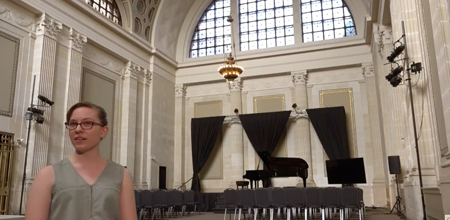Music Performance Degree: Instrumental
Bachelor of Music (BMus)
Credits
129
Completion Time
4 Years
Delivery Method
Traditional, On Campus at Lancaster, PA
Why Study Instrumental Performance at LBC?
Learn how to use your musical gifts to bring Him glory – no matter where you’re performing. We firmly believe that God gave us our talents, abilities and the arts as a way to express His creativity and love. The Bible is full of people playing music, showing us how God used – and still uses – music to move hearts. So, whether you play for an audience of one or for a full house, we’re dedicated to training you to be the best performer and disciple of Christ that you can be.
Through a blend of classes focused on all aspects of musicianship, theory and technique that seamlessly integrate a biblical worldview, you’ll learn about much more than just music performance – you’ll learn about the life-transforming truths of the gospel. Our Instrumental Performance program is available for keyboard, percussion, strings, winds and brass players who seek an intensive study on their major instrument. We pride ourselves on the fact that our students regularly interact with, learn about, and perform diverse genres of music, equipping them to become excellent instrumentalists in any number of performance settings.
Our instrumental performance major is unique for a number of reasons – our students begin performing in their first year of study, participate in weekly music performance forums, perform in solo recitals their junior and senior years, and have ample opportunities to perform outside of the college thanks to LBC’s relationships with a number of well-respected arts organizations. Our large ensembles strive to offer you the opportunity of rehearsing and performing “side by side” with local professionals, creating a unique apprenticeship experience, as well as real life preparation for the professional world.
Moreover, our students get the chance to study under professionals working in the music industry and learn from experienced professors who are also active performers. If you want to go to a college full of Christians that will push you to become a fully committed follower of Christ and an excellent performer, consider applying to Lancaster Bible College.
Course Length
16 weeks (semester)
Instrumental Performance Program Cost & Financial Aid
Admissions Process
Where LBC Students Have Interned
- Rehearsal Accompanist and Conductor for a Regional Theater Company
- Staff Accompanist and Arranger for a Touring Theater Company
- Percussionist for a Touring Country Western Band
Accreditation
Lancaster Bible College is accredited by the National Association of Schools of Music (NASM).
Can I Transfer Credits?
Yes! Read about LBC’s transfer policy
Other Music Performance Studies Available
Music Performance: Instrumental Program Scope
Bachelor of Music (BMus) (129 Credits)
LBC 100 Foundations Seminar 1 Credit
Bible & Theology Courses 33 Credits
Arts & Sciences Courses 37 Credits
Music Courses 58 Credits
Christian Service 0 Credit
View the Academic Catalog for the complete curriculum plan, course descriptions and complete program details.
What makes this LBC Instrumental Performance program unique?
- Learn and study under widely-renowned musicians, experienced instructors and long-time performers.
- Integrate your Christian faith and calling with your God-given musical abilities.
- Perform in our on-campus ensembles, at historic venues and alongside world-class, visiting musicians.
- Earn your degree from an accredited Bible college in PA.
What are career paths with a Instrumental Performance bachelor's degree?
The Instrumental Performance program prepares students for a wide range of technical and/or ministry contexts. Here is a sampling of careers and opportunities this degree affords:
- Accompanist
- Church Worship Leader
- Composer
- Conductor
- Orchestral Musician
- Private Music Teacher/Instructor
- Performer
- Soloist
- Songwriter
Instrumental Performance Program Goals – In this program, students will…
- Demonstrate basic musicianship skills in sight-singing, dictation, conducting, voice, and piano.
- Describe and demonstrate the integration of biblical faith in life and career as artists.
- Apply historical and theoretical understanding to the analysis, performance, and creation of musical forms, processes, and structures found in representative examples from the western music tradition.
- Demonstrate professional skills on a primary instrument.
- Demonstrate a knowledge of the important composers and their works for a primary instrument.
Core Courses in the Instrumental Performance Program
- MUS 100 Music Fundamentals
- MUL 100 Piano Fundamentals
- MUL 101 Piano Lab I
- MWP 102 Intro to Music, Worship, & the Performing Arts
- MWP 400 MWPA Cross Cultural Externship
- MUS 101 Music Theory I
- MUS 101L Musicianship I Lab
- MUS 102 Music Theory II
- MUS 102L Musicianship II Lab
- MUS 211 Introduction to Composition
- MUS 211L Musicianship Lab III
- MUS 301 Music Theory IV: Adv. Harmony
- MUS 301L Musicianship Lab IV
- MUS 330, 331, or 332
- ENS Ensembles
- MAP Applied Vocal/Instrumental Study
- MAP 100 MPWA Forum
- MUL 102 Piano Lab II
- MUS 221 Conducting I
- MPD 305 Pedagogical Methods for Music Instruction
- MPR 311 Instrumental Repertoire I
- MPR 312 Instrumental Repertoire II
- MPR 399 Junior Recital
- MPR 401 Performance Career Seminar
- MPR 499 Senior Recital
- MWP 301 Worship & Performing Arts Internship I
- MWP 302 Worship & Performing Arts Internship II
- MWP 450 Worship and Performing Arts Practicum
- MPD/MUS/MUE Elective
Meet the Instrumental Program Faculty
Doris Hall-Gulati, MM
Part-time Faculty, Director of Instrumental Studies. Director of LBC Orchestra
Admission Steps
for this Major
Audition for Acceptance into this Major
Every student who applies to any major in the Music, Worship & Performing Arts Department must audition for acceptance into the major of their interest and must also be accepted as a student to Lancaster Bible College.
